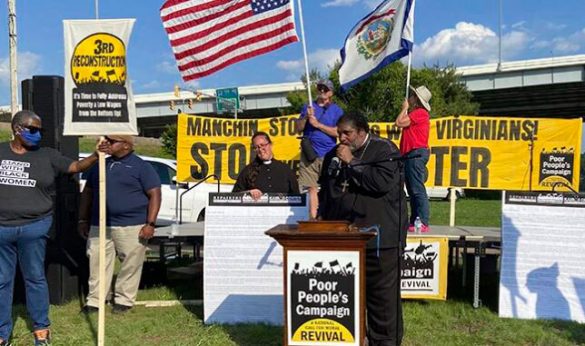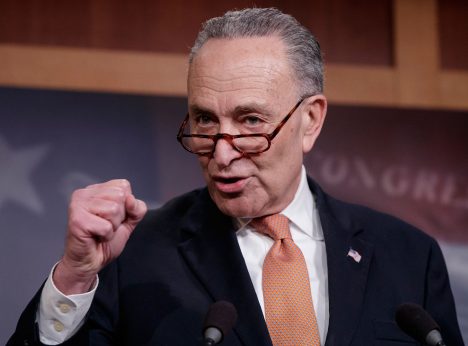
WASHINGTON (PAI)—Not waiting for the Republican-clogged U.S. Senate to act, the Democratic Biden administration’s Justice Department will step up voting rights enforcement, big time. And it’ll concentrate its resources—and its lawyers’ talents–on states like Florida and Texas that are the biggest threats to voters, especially voters of color but also working-class voters in general.
And organized labor, led by the AFL-CIO, and 86 other unions, civil rights, and civic groups, all organized by the Leadership Conference for Civil and Human Rights, is cheering Biden’s Attorney General, Merrick Garland, on.
“Barriers to the ballot box are antithetical to our democracy and must be torn down,” they declared.

Garland’s June 11 speech came as the Senate prepares to vote on the For The People Act (HR1/S1), and as progressive groups, including the Poor People’s Campaign and Our Revolution—the Bernie Sanders supporters—step up their lobbying for it. Senate Majority Leader Charles Schumer, D-N.Y., plans to bring it to the floor the week of June 21, even without the votes to pass it.
And he doesn’t have them. In the 50-50 Senate, GOP leader Mitch McConnell, R-Ky., has united almost his entire caucus against it. And Sen. Joe Manchin, D-W. Va., the most conservative Senate Democrat, has proposed a stripped-down alternative which, he hopes, will bring along the ten Republicans needed to halt the GOP filibuster.
Noted voting rights activist and mobilizer Stacey Abrams endorsed Manchin’s “compromise,” but dictator McConnell shot it down, too.
“The manipulations and tactics of those like Manchin, McConnell and the ruling wealthy elite demand a mass movement of poor and low-wealth people and their allies for a Third Reconstruction,” including HR1/S1, said the Rev. William Barber II, founder and co-chair of the Poor People’s Campaign.
It will stage a two-hour mass nationwide zoom call-in, including a short speech by President Joe Biden, on the evening of June 21, and an in-person rally in D.C. two days later. Data about the call-in is here.
Garland isn’t waiting for the vote, given absolute right-wing and Republican opposition to both HR1/S1 and the John Lewis Act, both of which would protect and expand everyone’s right to vote, and to have their votes counted fairly and without political interference.
For workers, the For The People Act is key alongside the Protect the Right to Organize Act, the most wide-ranging pro-worker labor law reform since the original National Labor Relations Act of 1935. And the John Lewis Voting Rights Advancement Act (HR4) is also critical.
The Lewis Act, named for the late and great civil rights leader-turned-congressman from Atlanta, would restore the “teeth” to the 1965 Voting Rights Act. The GOP-named five-man majority on the U.S. Supreme Court pulled those tough enforcement teeth in the Shelby County case almost a decade ago.
The For The People Act would roll back enormous voting rights restrictions right-wing GOP-run states such as Georgia, Florida, and Texas enacted, plus so-called “Voter ID” laws, which began in GOP-run Indiana, and almost 400 more impending curbs. All target voters of color, women, youth, and, among them, workers.
HR1/S1 also would level the playing field for workers by forcing exposure of corporate “dark money” that now drowns out workers’ voices in political campaigns. It bans the variety of GOP voter repression methods—such as shutting polling sites, letting partisan “poll watchers” interfere with voters of color, and allowing state legislatures to override popular vote results.
The Lewis Act would restore automatic Justice Department preclearance for voting changes in cities, counties, and states with histories of voting discrimination. In the 2013 ruling, Chief Justice John Roberts threw preclearance out. He said the list of suspects was outdated.
The Lewis Act, sponsored by Rep. Terri Sewell, D-Ala., whose district includes areas in which much of U.S. civil rights history unfolded, changes the formula so the law’s key preclearance Section 5, which the court negated, comes back into force. From the Voting Rights Act’s 1965 enactment through 2006, Garland said, DOJ had to toss more than 1,000 state and local voting restrictions, using Section 5. All were in named states or jurisdictions, mostly in the South.
Instead of naming specific states, counties, or other governments, the new John Lewis Act would force preclearance for ten years on any state that violated voters’ rights at least 15 times in the preceding 25 years and on any other political jurisdiction—such as, say, a county board—with three violations during the preceding 25 years.
The right-wing Republicans, led by McConnell, and catering to Trumpism, racism, and white nationalism, plan a filibuster, just as they plan to filibuster the Protect the Right to Organize Act. Faced with that gloomy scenario, Garland moved ahead.
“There are many things open to debate in America. But the right of all eligible citizens to vote is not one of them. The right to vote is the cornerstone of our democracy, the right from which all other rights ultimately flow,” he told the crowd, before announcing concrete moves.
They start with doubling the number of attorneys in DOJ’s Civil Rights Division and using the Voting Rights Act’s other enforcement provision, Section 2, to go after racist voting actions. But Section 2 is more general, has a tougher standard of proof, and the DOJ can act only after the violation occurs. There’s no preclearance.

That won’t stop Garland, even though he acknowledged, quoting the late Attorney General Bobby Kennedy, that going county by county “is a painfully slow way of providing what is, after all, [a] fundamental right of citizenship.”
Garland will also use other federal laws to go after the racist restrictions. They include the Help America Vote Act—passed after the “Brooks Brothers riot” of right-wing Republicans stopped the vote count, “hanging chads” and all, in South Florida in 2000—and the Motor Voter Act. Garland didn’t say how, leaving that up to the career Civil Rights Division attorneys.
But even those efforts won’t stop all the Republican racist anti-voter schemes, Garland admitted. Exhibit A is the farce Arizona’s ruling State Senate Republicans ordered in having a private firm whose boss echoes Donald Trump’s lies about “voter fraud” recounting all 2.1 million ballots cast in the state’s dominant Maricopa County (Phoenix).
“The Civil Rights Division has already sent a letter expressing its concern that one of those audits may violate provisions of the Civil Rights Act that require election officials to safeguard federal election records,” Garland said. “The division also expressed concern the audit may violate a provision of the Voting Rights Act that bars intimidation of voters.”
Though the stepped-up enforcement can’t catch everything, the unions and civil rights groups cheered Garland’s speech and urged lawmakers to follow up by passing the two bills.
The 87 group signers included the AFL-CIO, the Communications Workers, the Auto Workers, Workers Circle, the Service Employees, the A. Philip Randolph Institute, AFSCME, both the National Education Association and the American Federation of Teachers, the Coalition of Black Trade Unionists, Labor’s Council for Latin American Advancement, and the Retail, Wholesale and Department Store Union.
“We echo the call from the administration for Congress to pass the For the People Act and the John Lewis Voting Rights Advancement Act to make the promise of our democracy real for all,” they said.












Comments